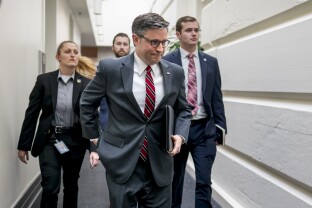The House has passed the National Defense Authorization Act, with 81 Democrats voting alongside the vast majority of Republicans, despite the inclusion of a provision to prohibit transgender minors from receiving gender-affirming care under the military’s health insurance system.
Minority Leader Hakeem Jeffries said Wednesday that he told House Democrats to vote for what they thought was best for their district.
“We’re not whipping on the National Defense Authorization Act,” Jeffries said Wednesday. “It’s a member-to-member, case-by-case analysis.”
Democrats told NOTUS earlier this week the NDAA would be a difficult vote, forcing Democrats to choose between pay increases for service members and funding for military modernization and the rights of transgender youth.
The top Democrat on the House Armed Services Committee, Rep. Adam Smith, said he’d vote against the bill because of that provision and told NOTUS he expected many of his colleagues would follow his example.
In the end, the majority of Democrats voted against the bill, as did 16 Republicans.
Smith said many of the transgender children of service members, some 6,000 to 7,000, according to the lawmaker, are currently receiving hormone treatments. The medical community has found those treatments to be safe and can go a long way to address the mental health of transgender youth.
“We rejected a lot of the worst House language,” Smith said before the vote, noting that negotiations between the two chambers of Congress had resulted in a relatively clean bill until House Speaker Mike Johnson pushed to include a line on transgender minors. “There is one problem,” he said of the provision.
“Speaker Johnson very specifically insisted that this stay in,” Smith said.
Smith said doctors had “no dispute” that, in some cases, treatments that the provision would deny have saved lives.
The vote comes as some Democrats, like Reps. Tom Suozzi, have blamed the party for “pandering to the far left” on issues surrounding transgender youth. Suozzi voted in favor of the NDAA. Others, like Rep. Seth Moulton, who shared a similar opinion as Suozzi on the party’s position on transgender girls in sports, voted against the NDAA, calling out Republicans for adding poison pill provisions in must pass legislation.
House leadership was “lying to us about making it a clean bill,” Moulton told NOTUS. “We didn’t even have a conference process this year because leadership just said, ‘Oh, we’ll just handle it ourselves,’ and look what we got as a result,” he said.
The late addition of the provision swayed Democrats to agree with him.
“If we allow them to get away with this, they’re just going to keep doing it,” he said just hours before the vote. “Every defense bill going forward can be politicized, just like this one is.”
Among Republicans, many hard-liners in the party came out against the final bill saying they couldn’t support the increase to the overall government budget.
Rep. Chip Roy voted on the Rules Committee for the bill to move forward for the full vote in the House. He told reporters that he wasn’t planning on voting for the bill on the floor though.
His colleague and former chair of the Freedom Caucus, Rep. Jim Jordan, did vote for the defense bill. But he told NOTUS some insight into just how many of his close colleagues would join Roy.
“I like the whole stopping gender surgery stuff, and I like the pay raise for our men and women in uniform,” Jordan said. Though he thinks the Department of Defense is “the right place to spend,” he’s at times voted against previous NDAA rounds, often seeing his “no” vote as a way to signal his desire to bring government spending down.
—
John T. Seward is a NOTUS reporter and an Allbritton Journalism Institute fellow.
Sign in
Log into your free account with your email. Don’t have one?
Check your email for a one-time code.
We sent a 4-digit code to . Enter the pin to confirm your account.
New code will be available in 1:00
Let’s try this again.
We encountered an error with the passcode sent to . Please reenter your email.


